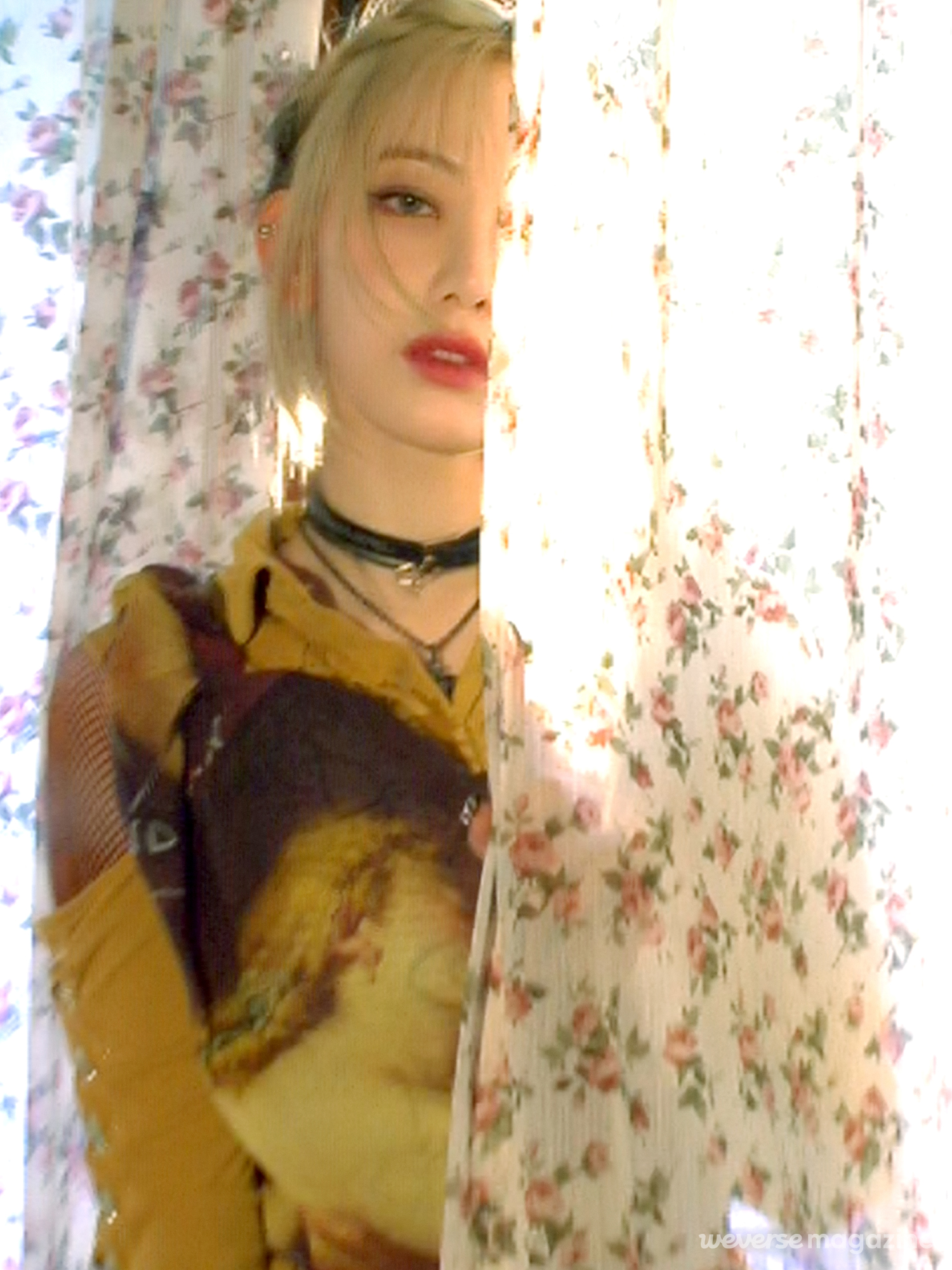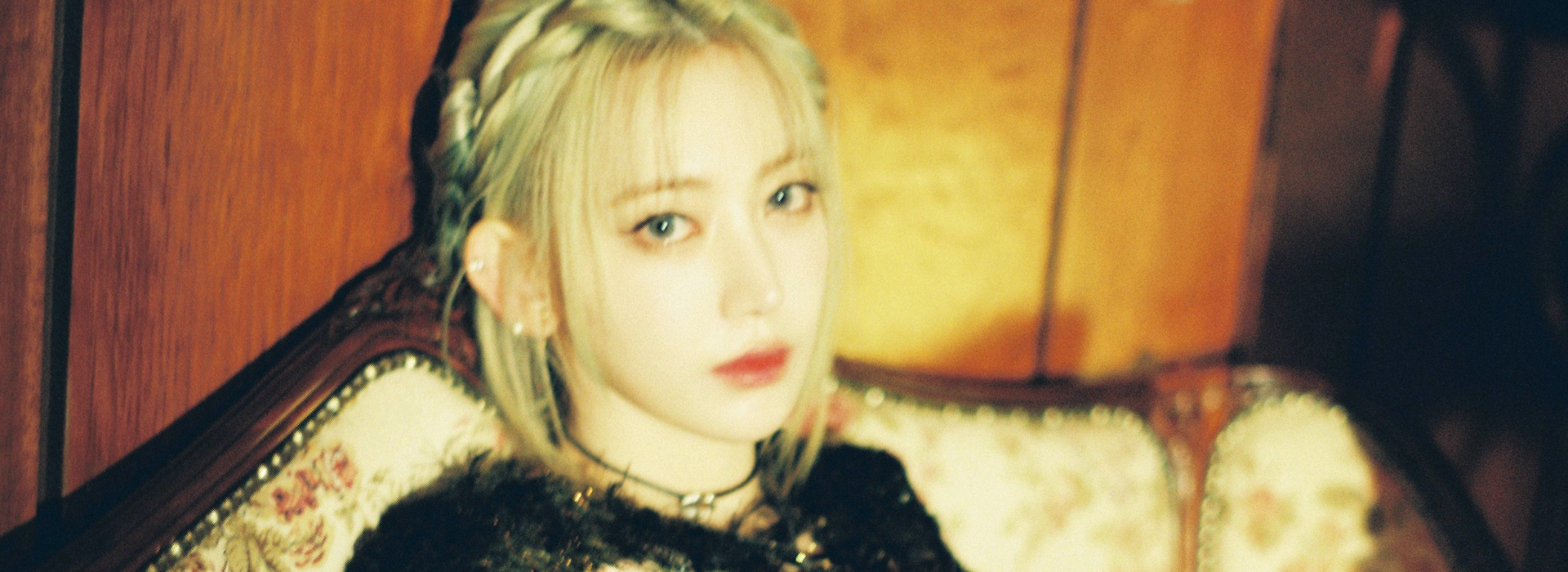
SAKURA’s spent half her life as an idol. She performed in Japan, then Korea, and now she takes to stages all across the globe. Yet there’s still so much left for her to experience—so many new things to keep her hopeful. She has a foot in both the ever-changing and the never-changing worlds, moving in and out between them like steady breathing.
-
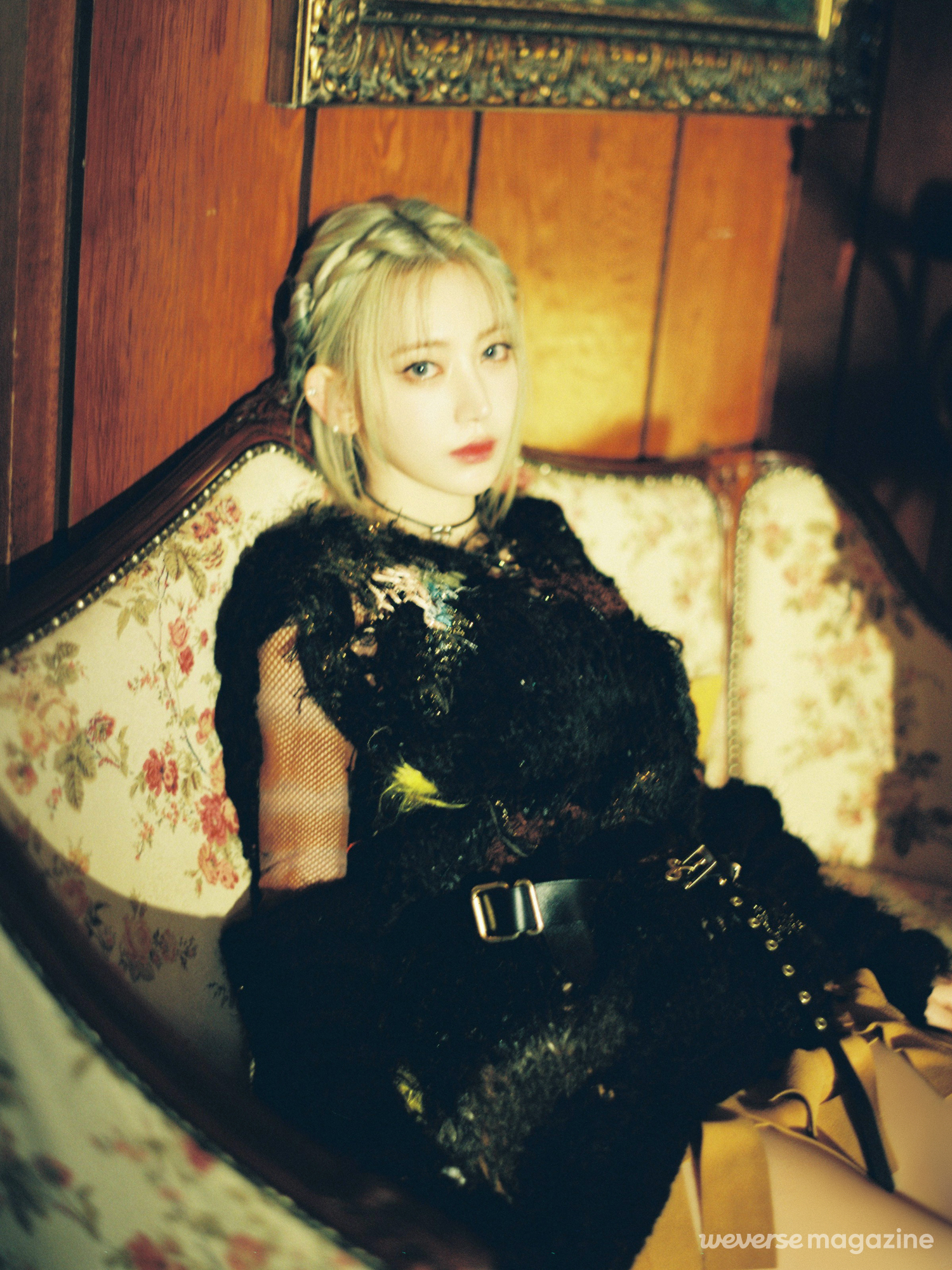 Snowdon knit sweater; courrèges checkered dress; Newsian mesh top; EYTYS suede skirt and belt; AMBUSH® earrings and silver necklace on belt; ±BALANCE silver heart choker; Challotte CHESNAILS bracelet on right hand.
Snowdon knit sweater; courrèges checkered dress; Newsian mesh top; EYTYS suede skirt and belt; AMBUSH® earrings and silver necklace on belt; ±BALANCE silver heart choker; Challotte CHESNAILS bracelet on right hand.
How do you feel from all the love that came pouring out for LE SSERAFIM after “Perfect Night”?
SAKURA: I could tell how many more people recognize us now. It feels like our music’s seeping into everyday life now—even people who aren’t K-pop fans are doing challenges with our songs, and you can hear our music out in the street. I love it. It gives me hope that LE SSERAFIM can become an even more influential group in the future.
Visiting the United States as LE SSERAFIM for the first time to promote “Perfect Night” must have been an exciting experience for you.
SAKURA: I went to New York for about two weeks for a musical workshop when I was in elementary school. I was just an average girl with a dream back then, but returning to New York as a K-pop artist and seeing Times Square felt incredible. Life really is full of surprises. (laughs) I’m still not very good at English, but that actually made it more exciting for me. It’s a positive feeling, knowing there’s still more I can learn and experience. Even though my English isn’t perfect, people there were welcoming and enthusiastic, so I wasn’t afraid to speak up. When it comes to language, all you really need is time. I had a really hard time learning Korean at first, but now I know it comes to you with time, so I approach it with a positive mindset: Keep at it and someday you’ll get there!
People were really talking about what you said to JAEHYUNG JUNG on Psick Show in English—as the show’s mostly in English, despite being a Korean show. People also really liked “JAEHYUNG and SAKURA,” the impromptu video you made after.
SAKURA: I’m very aware that content needs to be engaging, and I think I’m pretty good at subconsciously picking up on the flow. You get a sense pretty quickly on variety shows of how much you can get away with to keep things fun for viewers and for the other people on the show without being seen as rude. When I was on Psick Show, I felt like I could ask JAEHYUNG somewhat biting questions without making things awkward. We filmed “JAEHYUNG and SAKURA” completely unplanned, and I asked him what kind of talents he has out of genuine curiosity. I didn’t expect people to find it so amusing. (laughs) The Psick University trio came to the HYBE building for that, and after we were done filming everything, they said to me, “How are you so good at making funny observations? You’re better than most comedians.” That made me feel really good. (laughs)
-
 Corset and square bag by Vivienne Westwood; printed lace-up top by YUEQI QI; mesh top by Newsian; suede skirt by EYTYS; earrings by AMBUSH®; belt choker by the mysterious hotel; silver heart choker by ±BALANCE.
Corset and square bag by Vivienne Westwood; printed lace-up top by YUEQI QI; mesh top by Newsian; suede skirt by EYTYS; earrings by AMBUSH®; belt choker by the mysterious hotel; silver heart choker by ±BALANCE.
You seem quite a bit more relaxed than before. Do you think that could be from being around the other LE SSERAFIM members and their diverse backgrounds, coming from Korea, Japan, and the US?
SAKURA: It’s fun because we’re all so different. (laughs) It’s exciting how we keep discovering new things about each other as we get to know each other better. We even grew up eating different snacks and listening to different songs. When we were in the US, there were several times I went Oh, this is why YUNJIN is like this and that. The other members probably felt the same way about me and Zuha when we were in Japan. Because our group has people who speak all different languages, I feel safe and reassured wherever we go.
What was it like performing on tour in different places like Korea, Japan, Hong Kong, and Jakarta? It couldn’t have been easy for the five of you to do those performances from start to finish.
SAKURA: It was my first tour with LE SSERAFIM, and it felt like it was up to just the five of us to fill the whole space. The pressure was on to be an integral part of LE SSERAFIM—all five of us performed throughout the whole thing, with no solo or unit songs, and we didn’t have any backup dancers except in Seoul. And I was scared it would have a negative effect on the others if I wasn’t feeling well. But even though it’s normal for me to tire out easily, I wasn’t sick even once during the tour. (laughs) As soon as the concert starts, it’s so fun and exciting that I don’t feel tired at all.
KIM CHAEWON got people talking with her “dododok” moment, but people were also really interested in how focused you were on your solo performance of “Fire in the belly” despite how funny she was being.
SAKURA: I already had my “switch on,” so I couldn’t laugh. We hadn’t shown that song to FEARNOT much at that point, so all I had on my mind was putting on a good performance. Our performance director said I had to show my solo dance “with my eyes,” and that’s all I could think about. (laughs) I’ve always had pretty good concentration. I was able to do nothing but knit for five hours straight on the flight to the US without losing my focus. It’s actually harder for me to turn the “switch off” and chill. I’m trying not to focus solely on myself when we’re on stage now. Sometimes, to get in step with the others, I need to feel their rhythm, listen to the sounds around us, or get a feel for what’s in the air.
You make it look easy, but what you do is anything but. It’s like how, in the “Good Bones” trailer for EASY, you get a nosebleed after shooting lasers from your eyes to break through a wall.
SAKURA: That nosebleed scene alone took over an hour. We ended up filming late into the night for that—that’s how challenging it was. When I heard we’d be shooting a scene where I shoot lasers from my eyes, I was worried it would look silly, but once we started filming it, I understood the feeling the director was going for. I felt like the trailer was my life exactly—it made me feel both pity and pride. (laughs) Everyone has a tough life, but we all go around living like it’s nothing and making it look easy. I didn’t really want the audience to sympathize with our struggles, though.
Then what was it you wanted to convey?
SAKURA: I wanted to convey a message of consolation. People might look around and think the world’s full of naturally gifted individuals so they’ll never come out on top no matter how hard they try. But I’m not a natural, and so I’ve always had to work hard, and what I found out was that people who look like they’re naturally gifted had to work extremely hard to come off that way. So I believe there’s nothing you can’t do—that people can do anything they want to.
You also said in the “JAEHYUNG and SAKURA” video that you “work as an idol. But being an idol—I don’t think I’m perfect at it … I think I could come this far because I like what I do.”
SAKURA: Being an idol basically comes down to singing and dancing, right? But there’s actually other things I’m better at, so I wouldn’t say I chose to become an idol because it’s what I’m good at. And yet, I believe that I can become a kind of idol that no one else can. I’ve certainly never seen another idol quite like me. (laughs) Even some people who aren’t fans are curious to see how far I’ll go and how I’ll live my life. And I’m right there with them—I’m having a good time seeing how far I can go.
-
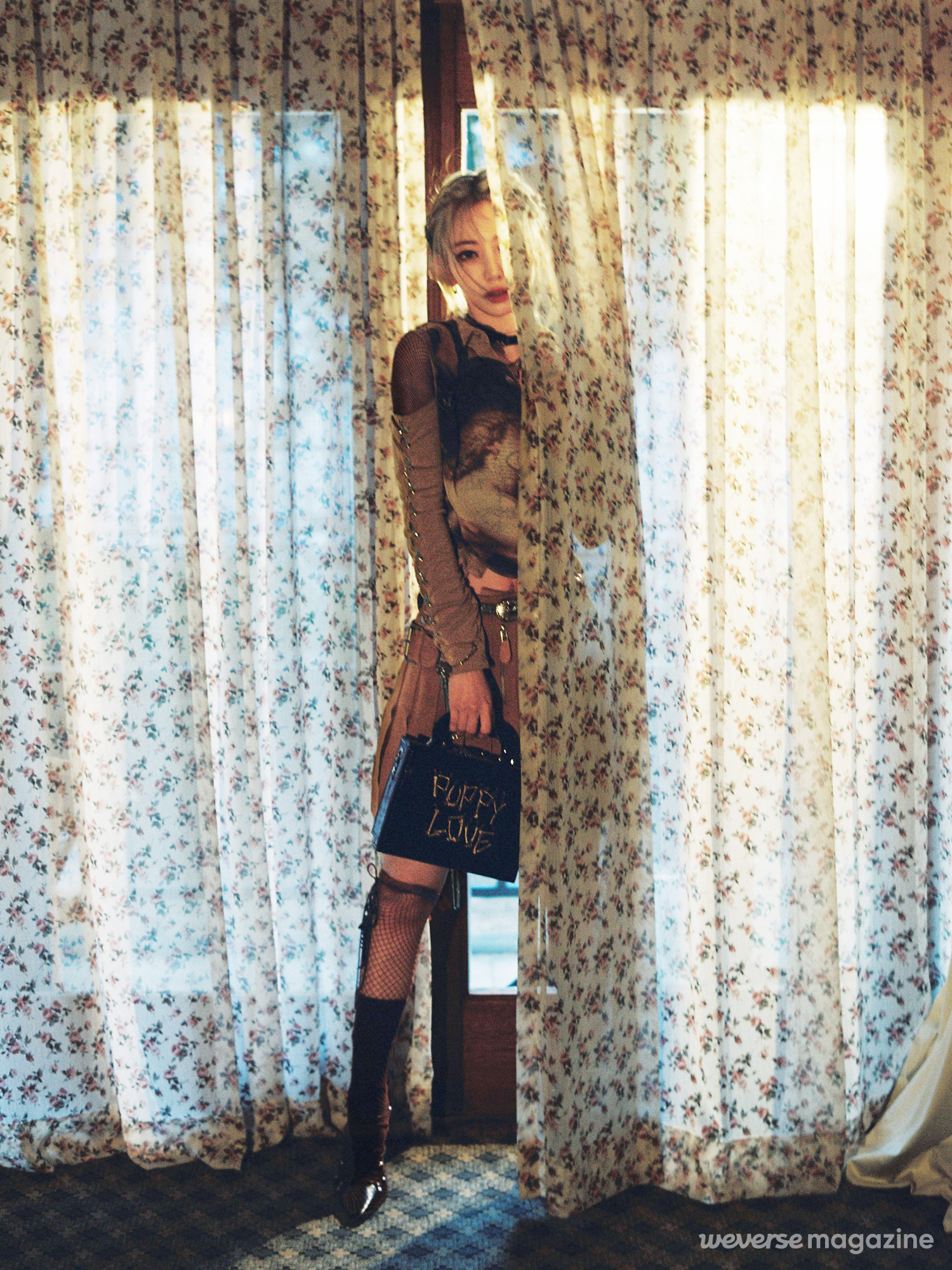 Key ring on the sock by HYEIN SEO; pumps by steven ma; vintage chain necklace, belt, and sheer socks from the stylist’s personal collection; custom bracelet by Tomoya Nakagawa.
Key ring on the sock by HYEIN SEO; pumps by steven ma; vintage chain necklace, belt, and sheer socks from the stylist’s personal collection; custom bracelet by Tomoya Nakagawa.
You took on a new challenge doing the new single “EASY,” wouldn’t you say? Unlike the typical formula for mainstream K-pop girl groups, this song and its choreography must require a completely different approach since you have to find your own vibe through hip hop.
SAKURA: It was very challenging. We kept joking while practicing it: “There’s nothing ‘EASY’ about this.” (laughs) Our group is known for our tight choreography, and it’s basically automatic for us to get ourselves in sync when practicing, but for this song, we had to prioritize our individuality over group synchronization. Every moment is a challenge. Still, being in LE SSERAFIM always gives us a chance to explore new territory, and it makes us feel like we’ve gained a lot from overcoming those challenges. I’m quite sure we gained something valuable this time, too. This new album felt like a particularly collaborative process, talking things through with the label and sharing ideas, including writing some lyrics for “Swan Song.” I felt how much our label respects us as artists.
Since you’re a K-pop group aiming for mass appeal, were you concerned about expressing such direct messages on the album? It’s an intriguing new kind of album that could almost be seen as an antithesis to K-pop, but that must bring its own pressures.
SAKURA: Well, at any rate, I want to keep saying the things that only LE SSERAFIM can. While love stories and lighter songs are certainly important, I think songs unique to LE SSERAFIM are songs that we can sing right now and right now only. We thought about what we should say next after “UNFORGIVEN” (feat. Nile Rodgers). We couldn’t keep repeating the idea of being strong and unwavering. Now that we’re into our second year as a group, we thought it was time to show more of a personal, introspective side of us. The group members and the label all felt the same way. And we’re really living life as our album portrays. And I guess it must be the same for our fans. When we debuted, we really were “FEARLESS,” and when I hear that song now, I’m transported back to the way I felt at the time. I hope all of LE SSERAFIM’s songs will act as a kind of bookmark so we can revisit past versions of ourselves.
The lyrics you wrote for “Swan Song” are a candid backstage reflection of the way an artist feels.
SAKURA: I wrote those lyrics during the tour. They’re about continuing along my desired path despite the challenges I face. I actually see the idol version of me and the everyday me as being the same, so I don’t see it as work. I’ve spent half my life as an idol, and that portion’s only going to continue to grow. But this is what I’m meant to do, so I have to just keep on dancing. I’m “dancing to survive,” just like the lyrics say. Being an idol gives my life meaning. It’s both something I want to, and need to, do. It’s just a part of who I am now—so much so that I couldn’t live without it.
In some respects, I feel like being an artist means having to grapple with the challenge of showing different sides of yourself—things different from who you really are. It’s like the main character Nina in the film Black Swan and the way she stresses over portraying the Black Swan when she’s better suited for the White Swan, which is the complete opposite.
SAKURA: I had similar concerns while practicing for “EASY”. There’s a limit to who we’re born as, and some people might find some new image you come up with for yourself disappointing. But when I tried to meet those expectations, I felt worn out. Now, instead of conforming to the world’s expectations, I just be myself. It wouldn’t be too good for me if I got stressed out every time I faced change. I think I should do things my way and stay true to myself, because you’re still changing just by trying something new without giving into the pressure to change who you are.
So even though you asked, “But does all of this even matter?” in “Good Bones,” you’re just keep on going.
SAKURA: That part was something I actually said before. I used to think, Will there still be people who remember the exact year, month, and day LE SSERAFIM got first place on a music show 10, 20 years from now? Why do I have to feel these extremes of happiness and sadness? What does any of it matter? Success scares me, to be honest. Once you succeed, the next step is to do even better, and then I see my future self struggling. It even feels like my past self is tormenting me lately. But I keep racing forward, pushed ahead by my past self doing the same. What keeps me from stopping more than anything is the other members. If it were just me, I might think, This is good enough. But it’s the five of us, together, so I’m holding onto the hope that we can reach somewhere much, much higher. When I heard we were going to Coachella, I was shocked. I was like, Already? I wanted to go, but it seemed like something still a long way off. (laughs) But when such a lucky opportunity presents itself, I believe you have to work your butt off and seize it.
It’s like you said on Weverse Live after your Hong Kong concert in October: “We just live with the flow.”
SAKURA: Since last year, I’ve been trying to live a more balanced life, rather than focusing entirely on work. I was worried that just going with the flow like that would make me forget about everything I had. There’s a lot of waiting around when we’re busy, and all I ever did was watch short-form content on my phone. But it made me feel like I was receiving less input and that it probably wasn’t good for me. So now when we’re waiting, I do things that enrich me in some way—like knit, or read mystery novels. I know all about the life of an idol, but I came to realize I don’t know much about what other twentysomethings like me deal with or what makes them happy. There’s something comforting about understanding other people’s lives through reading. I enjoy seeing people, finding out about my fans’ lives, and even doing interviews like this.
You were once just a little girl growing up in nature-filled Kagoshima, but now your world keeps expanding wider and wider than you ever could have imagined.
SAKURA: I didn’t like seeing people when I was younger. I was really introverted, so my family encouraged me to do musicals, and now I’m doing something so far-flung from the way I was born. At first, it was my competitiveness that made me want to climb higher, but as I’ve risen, I’ve discovered how interesting it is to learn more about the world. And when the world presents a challenge, that’s when I start to feel exhilarated. It’s like a fresh start, I’d say: wondering what the world holds next—and how far I can go.



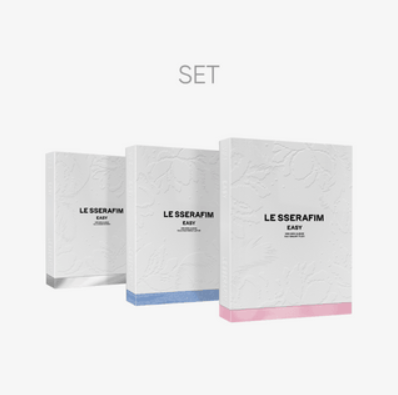
Unauthorized reproduction and distribution prohibited.

